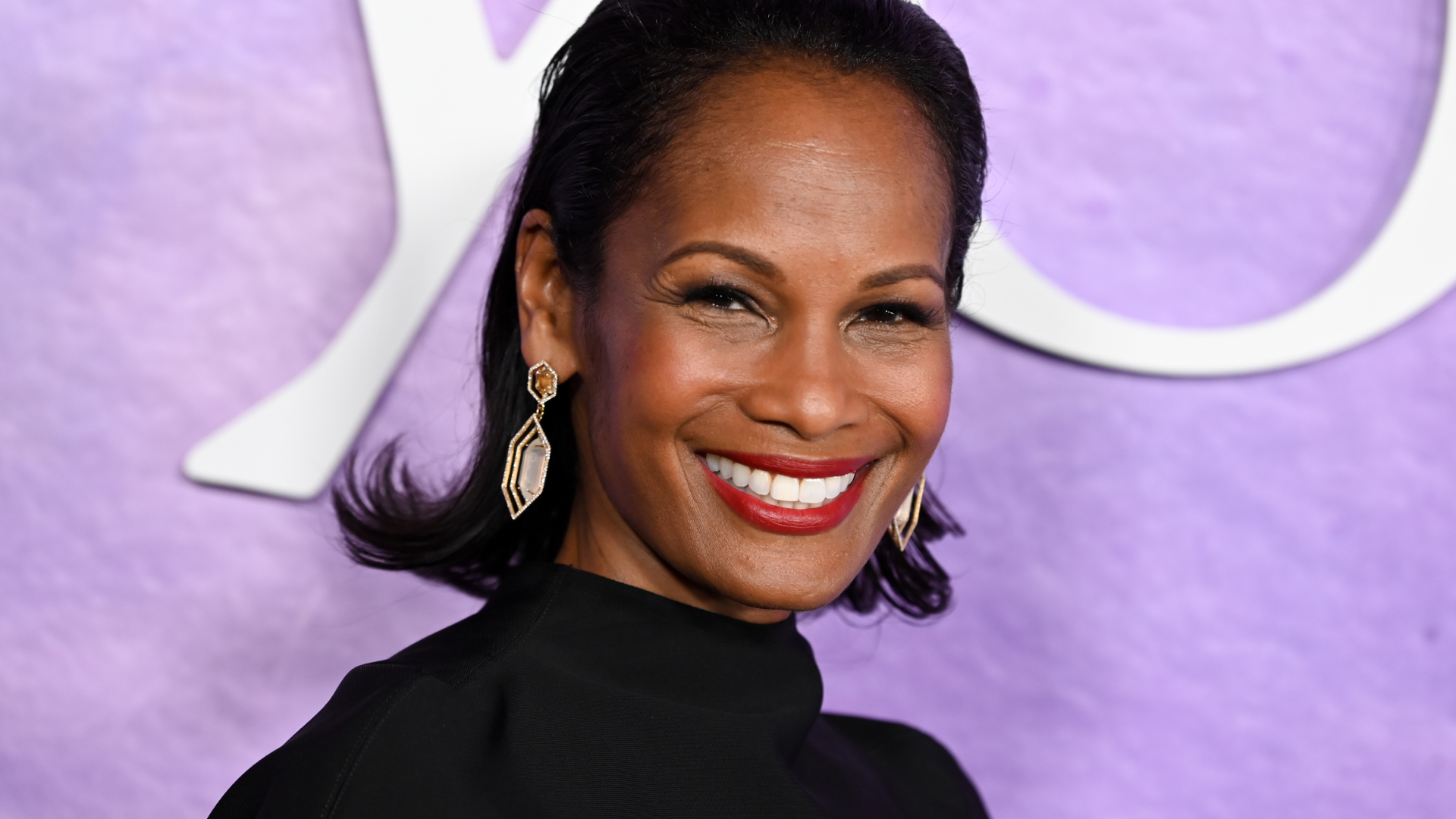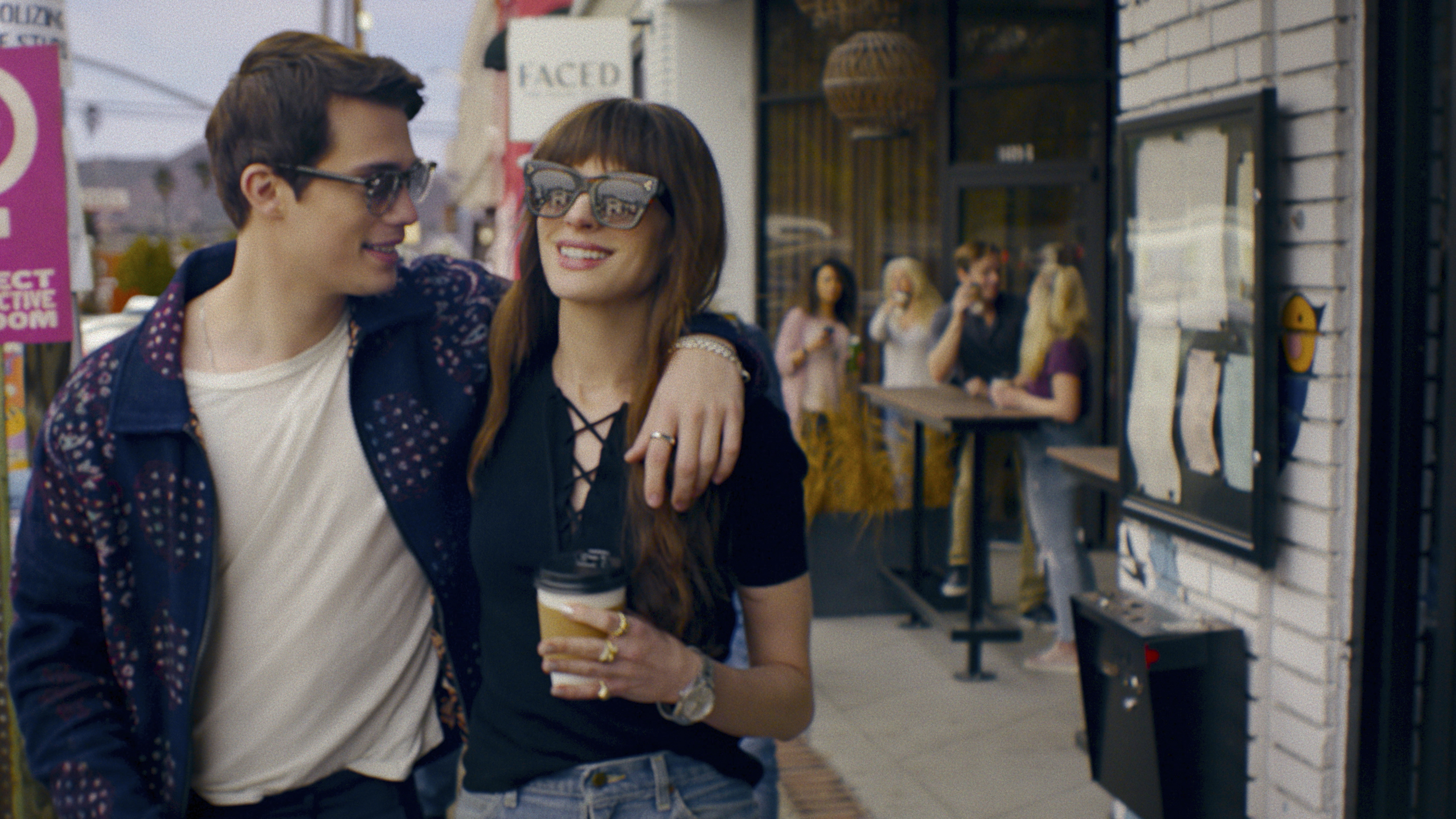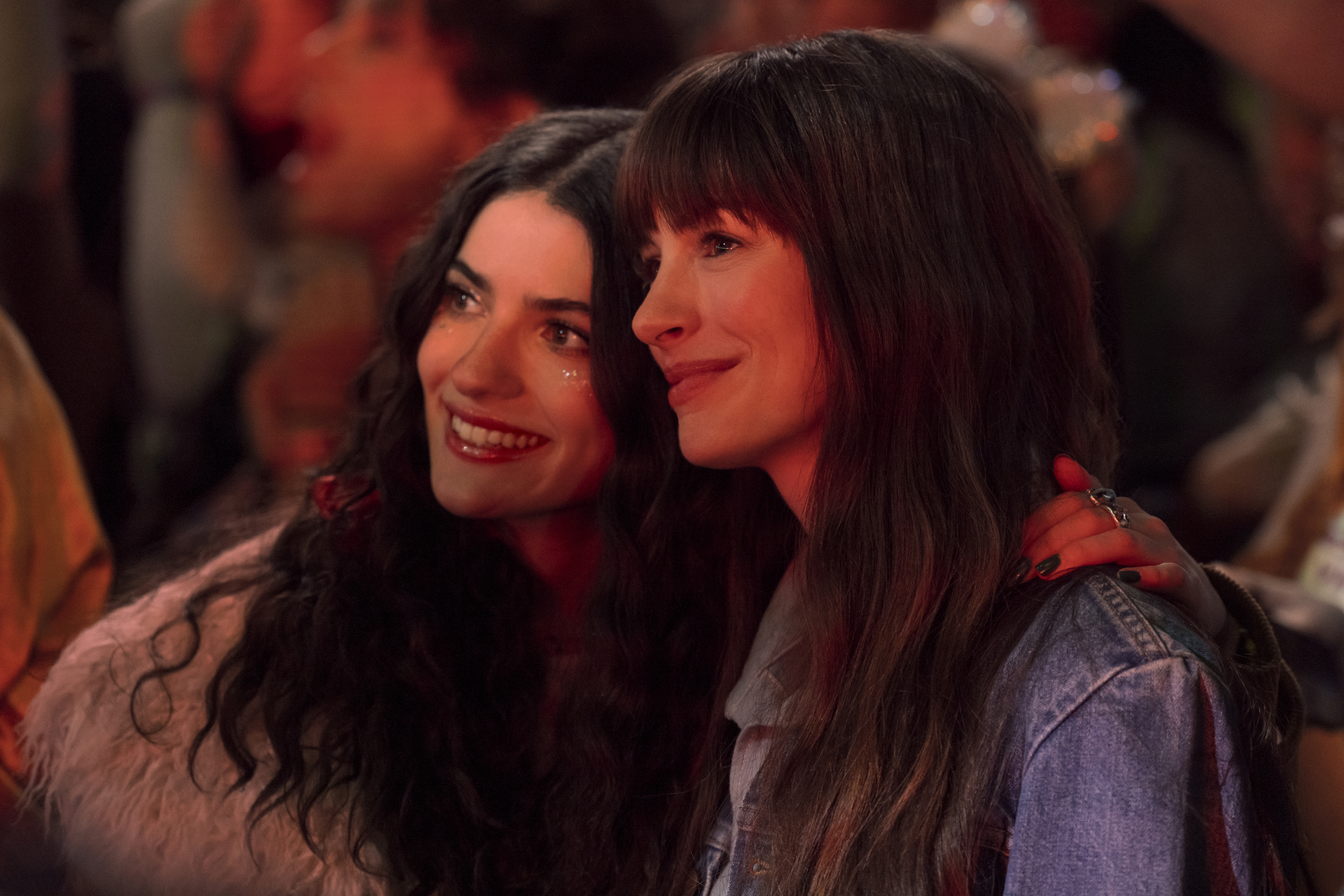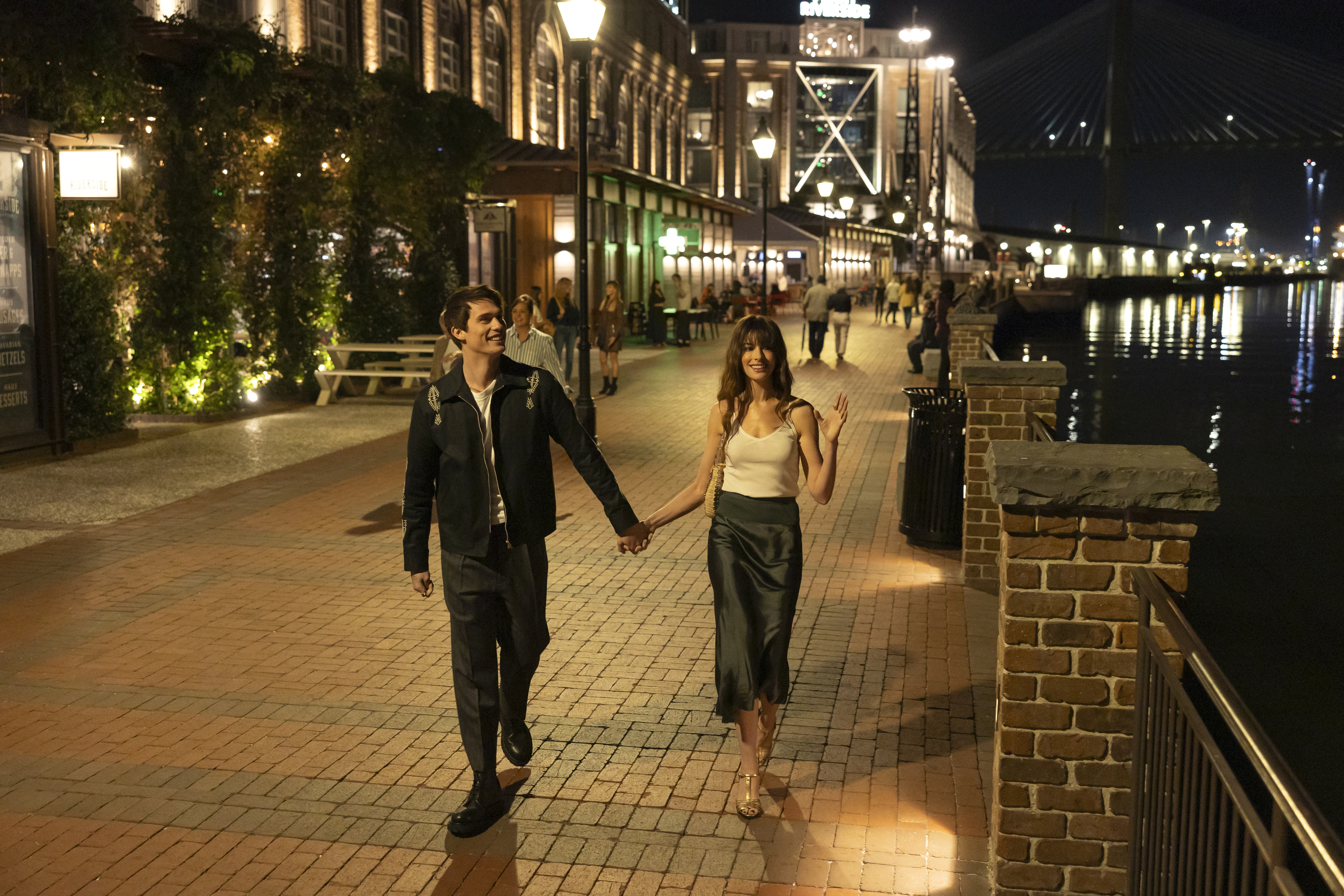Robinne Lee Knows Why We Love a Good Rom-Com
'The Idea of You' author discusses the new adaptation of her best-selling novel starring Anne Hathaway and Nicholas Galitzine.

When The Idea of You author Robinne Lee first heard a real song performed by August Moon, the fictional boy band at the center of her 2017 novel, the moment felt “surreal.” Lee first thought up the pop group nearly a decade ago, while crafting the story of a whirlwind romance between one of the band’s singers, Hayes Campbell, and a successful art dealer and single mom approaching 40, Solène. Now her novel has been adapted into one of the year’s most-anticipated movies, complete with a soundtrack that could be played through her home speaker. “I’d kind of dreamt this up, and now I could walk into my kitchen and ask Alexa to play the song,” she tells Marie Claire over Zoom, a week before the movie’s May 2 release on Prime Video.
Lee is no stranger to Hollywood; she’s a working actress who has appeared in beloved films like Hitch, 13 Going on 30, Deliver Us From Eva (in which she starred alongside her friend and The Idea of You co-producer Gabrielle Union), and the Fifty Shades trilogy. She has now earned her first producer credit on the Amazon Studios film, which stars Anne Hathaway and Nicholas Galitzine as the dreamy lead couple. Still, The Idea of You has introduced Lee to a new facet of fame, as her book about a middle-aged woman reveling in her sexuality has spawned both a passionate fanbase and notable controversy. “I feel like it's life imitating art. I wake up to messages and feel like, Oh my God, I'm Solène now,” Lee says.

Nicholas Galitzine as Hayes and Anne Hathaway as Solène in The Idea of You.
Below, Lee chats with Marie Claire about the big differences between her book and the film directed by Michael Showalter, how Hollywood representation is slowly changing for women over 40, and why it’s hard to be a celebrity in 2024.
Marie Claire: Now that The Idea of You has become a movie, what was your reaction to listening to actual August Moon songs for the first time?
Robinne Lee: The other morning I walked into my kitchen, and as a trial, I was like, 'Alexa, play August Moon.' And she started playing 'Dance Before We Walk.' It was so crazy to me that I'd dreamt up this band. I used to be a big Duran Duran fan when I was young, and August Moon is from a lyric in one of their songs, [‘The Wild Boys’]. In the book, all their songs, tours, and albums are named after different, more esoteric Duran Duran lyrics. The fact that I'd kind of dreamt this up, and now I could walk into my kitchen and ask Alexa to play the song, that was a very surreal feeling.
MC: Were there any parts of the book that you wished had made it to the big screen and didn’t?
RL: I love the scene at the restaurant in France and the first time Hayes really impresses Solène. You see that he's been working on how to speak the art world language and how to fit into her world. It's lovely seeing him as not the celebrity at the table; no one knows who he is. That would've been lovely to have seen. There's a scene with two of them in Miami when they're fighting because she's getting nervous, and it's starting to feel very real. He says [something] like, ‘Someone always gets hurt, but I don't want to walk away because I was afraid of getting hurt.’ I would've loved to see that exchange.
Get exclusive access to fashion and beauty trends, hot-off-the-press celebrity news, and more.
So many people find that in rom-coms because, if it's done well, you feel every moment of falling in love again.
MC: The biggest change from the book to the movie is the ages. Solène’s daughter Isabel (played by Ella Rubin) is aged up from 12 to 16, so she’s no longer the big August Moon fan she once was. What was your reaction to that aspect of the film?
RL: I knew they were doing that beforehand. They felt removing Isabel's fandom as a reason for the relationship to not work out would benefit the story for a viewer of the film. Literature is different because you have time to see everything that's going on in the character’s mind. So even though Solène is conflicted and does things that are not necessarily positive in the book, you also know that her heart's in the right place because you're able to read all that.
I love Ella Rubin, [who plays Isabelle]. I like her dynamic with Anne on screen and I buy her having outgrown August Moon. I buy her concern with her mom, but still, it's not as fragile. I wanted the fragility in the book because you have to swing for the fences. I wanted Hayes to be really young and I wanted Isabelle to be really young, because I wanted there to be higher stakes. When I saw the film, I was so wrapped up in the chemistry between Nicholas and Anne that I didn't have so much anxiety about Isabelle as I did writing her as a character.
MC: The book has a heavy focus on fashion. Why was it important to get to know Solène through her style?
RL: I have a Pinterest page of Solène's clothing that I started keeping when I was writing the book, so you can go and see everything. There's nothing she wears in the book that was not out at that time. They're all current designers or things I'd found that were vintage. It's all real.
In college, I interned for ELLE Magazine; I did every summer break and Christmas break and then for a full year in Paris. I'm a huge fashion person. I see it as an art, and she's in the art world. If you spend any time in the art world, you know that [with] all these people—art dealers, art consultants, and representatives—nothing is haphazardly put together. Everything is a very conscientious choice. This is how I'm presenting myself; I'm in this world and this is how I want the world to see me. So that was a really fun experience, dressing her and imagining her wardrobe.

Ella Rubin as Izzy and Anne Hathaway as Solène in The Idea of You.
MC: You've spoken before about how the idea for this book came from exploring the theme of a woman in her 40s, a mom, reclaiming her sexuality. Now that the film's coming out seven years after the book, do you feel anything has changed in visibility for women over 40?
RL: I know when the book was first coming out, I was noticing things. It came out at the same time as the first season of Big Little Lies. That, to me, was groundbreaking because we were seeing women of a certain age being sexy individuals. That hadn't didn't exist when I was writing the book in 2014 and 2015, but by 2017, it was out there in the world. I thought, Oh my gosh, this is incredible that we're seeing this now.
Another movie that came out around then is called Elle; it's a French film starring Isabelle Huppert, and it's very dark. She was nominated for an Oscar. It was so nice to see this French film get recognition, even by the American award season, of a woman being a sexual individual at 60, owning it, and being confident on screen.
I think that we don't get very many opportunities like that; it's slowly changing. But you also don't want to force actresses who don't feel comfortable being sexy to be sexy. Not everyone feels comfortable. So now you're looking for someone willing to do that at 40 and still feels good in her skin. Regardless of how we view her, she feels I can do this. I love Julianne Moore and she will do sexy. You need people like that who are not afraid. We need to see that. We need to see women who are comfortable in their skin and don't have to be 22.

Nicholas Galitzine as Hayes and Anne Hathaway as Solène in The Idea of You.
MC: The book explores fandom—from why people love it to the toxic parts of it and why art that's enjoyed by women and girls is often reduced. Since it's been published, your book itself has gotten a bit of a fandom. How has that changed your mind about the concept since 2017?
RL: I feel like it's life imitating art. I wake up to messages and feel like, Oh my God, I'm Solène now. I'm seeing all these things being written about me because I wrote this book. It's [often from] this blind space of judgment and hate, and I was like, Thank you for proving my point. I feel very comfortable in writing what I wrote because that definitely exists, and it's still out there.
I think it’s harder to be famous in the time of social media where people can reach out and tell you how they feel about you. I don't think people realize there's someone on the other end receiving that. I think about Gen Z and even younger millennials, growing up with all that access to celebrities, and what that does to people. You see so many celebrities leave social media and I totally get it, because it can be very toxic.
MC: The tradition of rom-coms based on books is long, but there's been a resurgence lately with movies like Red, White & Royal Blue and The Idea of You. Why do you think these movies are such a draw for people?
RL: People like things that make them feel good. Romantic comedies are the kind of thing that you can lose yourself in for 90 minutes, and go on a journey that you probably won't ever take in your life—or you did one time and it was a long time ago, or you hope it'll happen in the future. But it's like a fantasy. After 90 minutes, it's done, and you've gone on this rollercoaster of emotions.
I see movies because I want to feel something. I think as humans, we're just looking to make that connection. So many people find that in rom-coms because, if it's done well, you feel every moment of falling in love again. Falling in love is a magical thing, and it doesn't happen very often to people in real life over and over again. This is the way to let it happen over and over again. You can watch it, go for that ride, and then are like, 'Okay, done. Gimme the next one.'
This interview has been edited and condensed for clarity.
Quinci LeGardye is a Culture Writer at Marie Claire. She currently lives in her hometown of Los Angeles after periods living in NYC and Albuquerque, where she earned a Bachelor’s degree in English and Psychology from The University of New Mexico. In 2021, she joined Marie Claire as a contributor, becoming a full-time writer for the brand in 2024. She contributes day-to-day-content covering television, movies, books, and pop culture in general. She has also written features, profiles, recaps, personal essays, and cultural criticism for outlets including Harper’s Bazaar, Elle, HuffPost, Teen Vogue, Vulture, The A.V. Club, Catapult, and others. When she isn't writing or checking Twitter way too often, you can find her watching the latest K-drama, or giving a concert performance in her car.